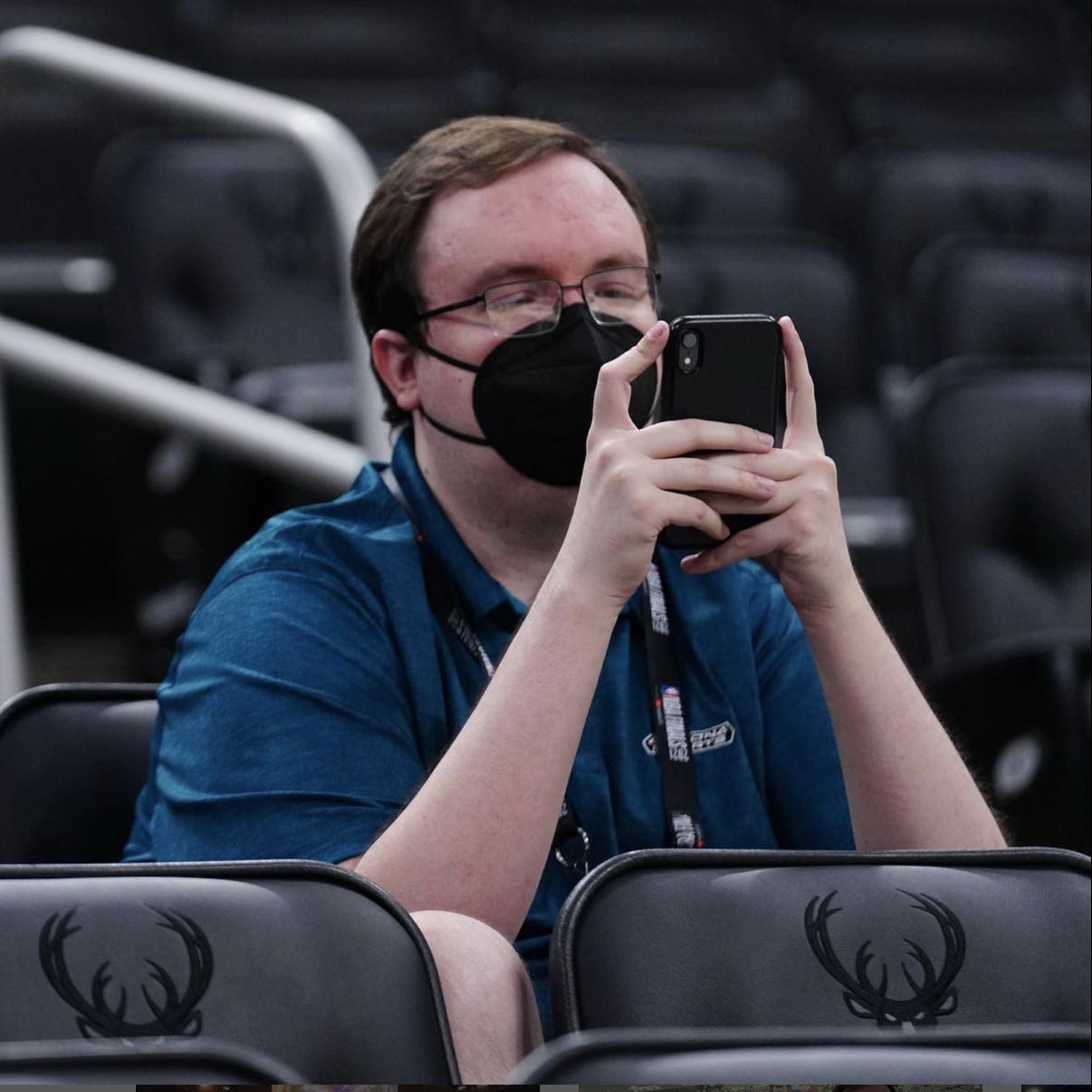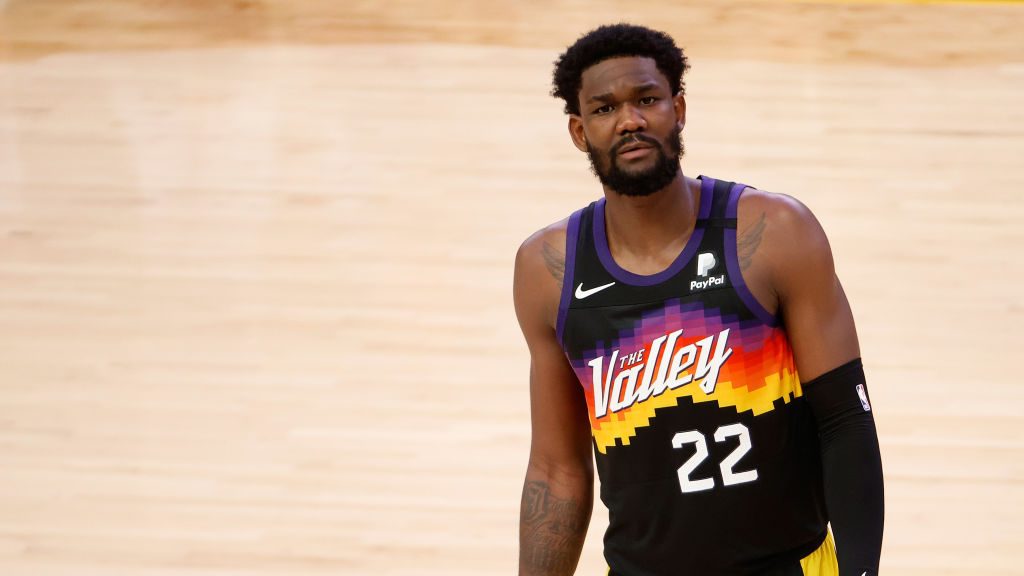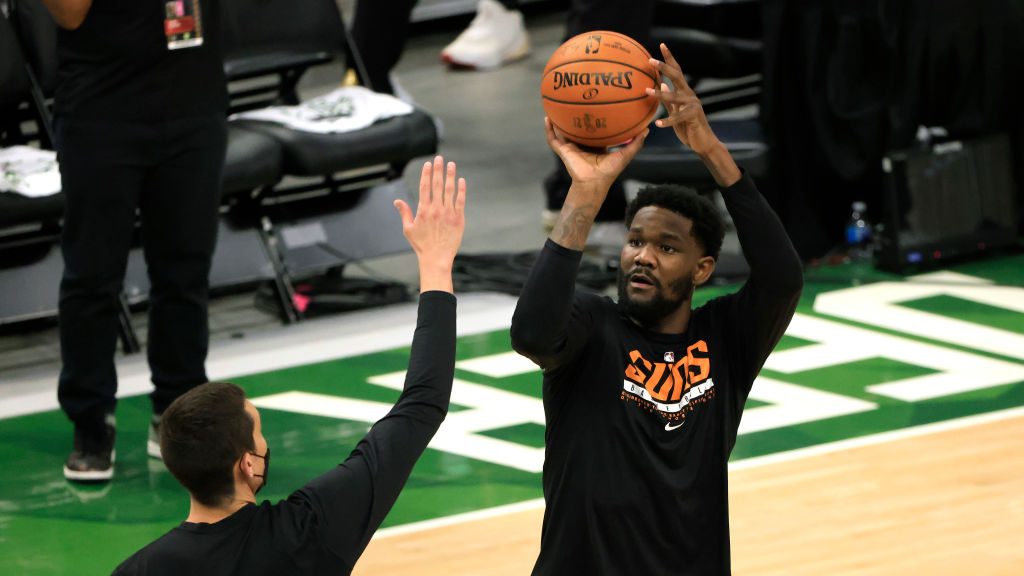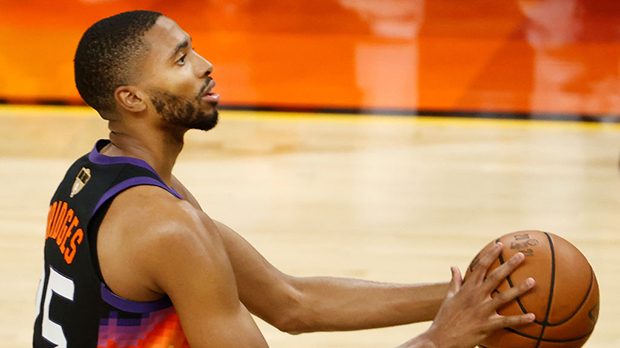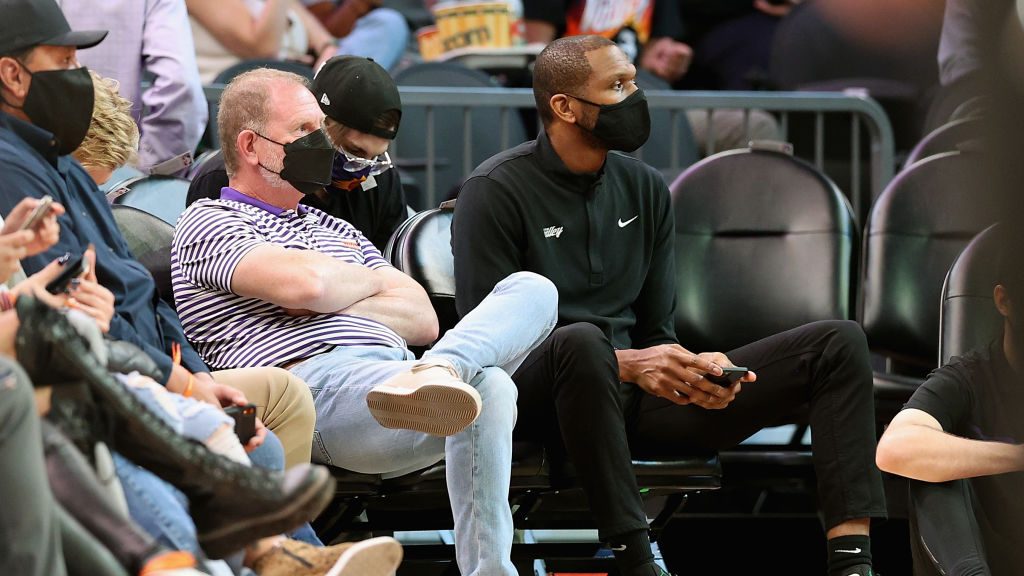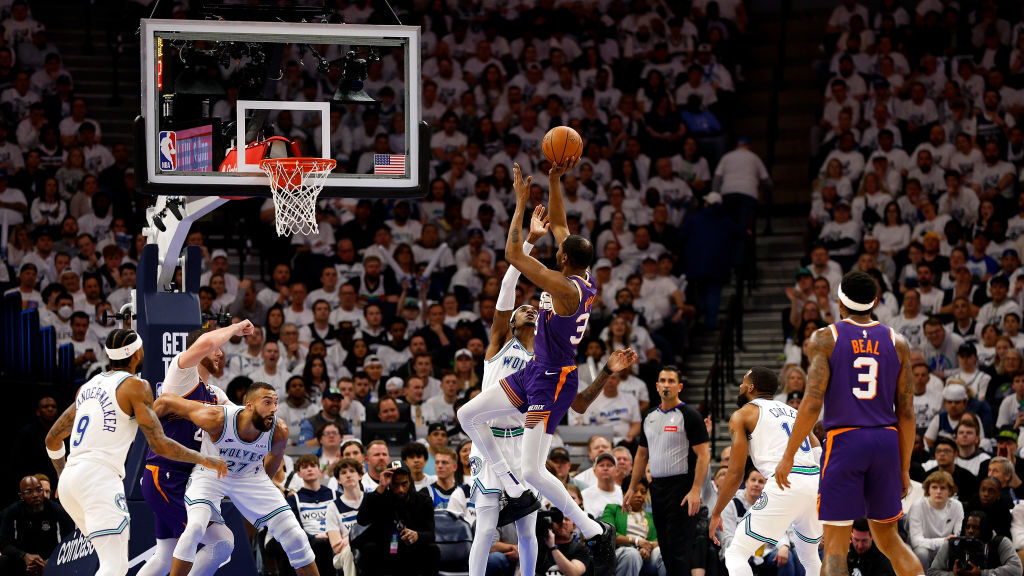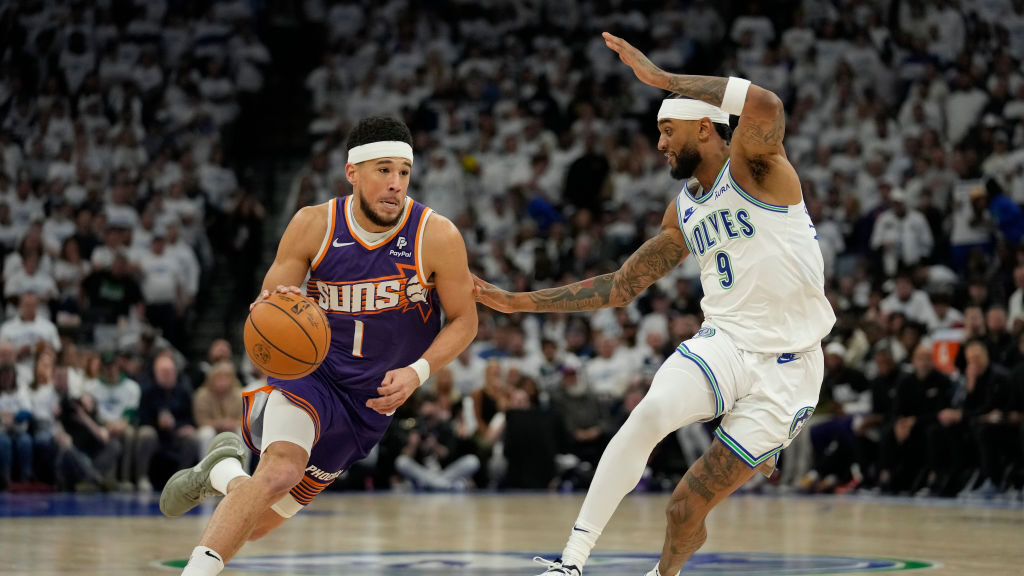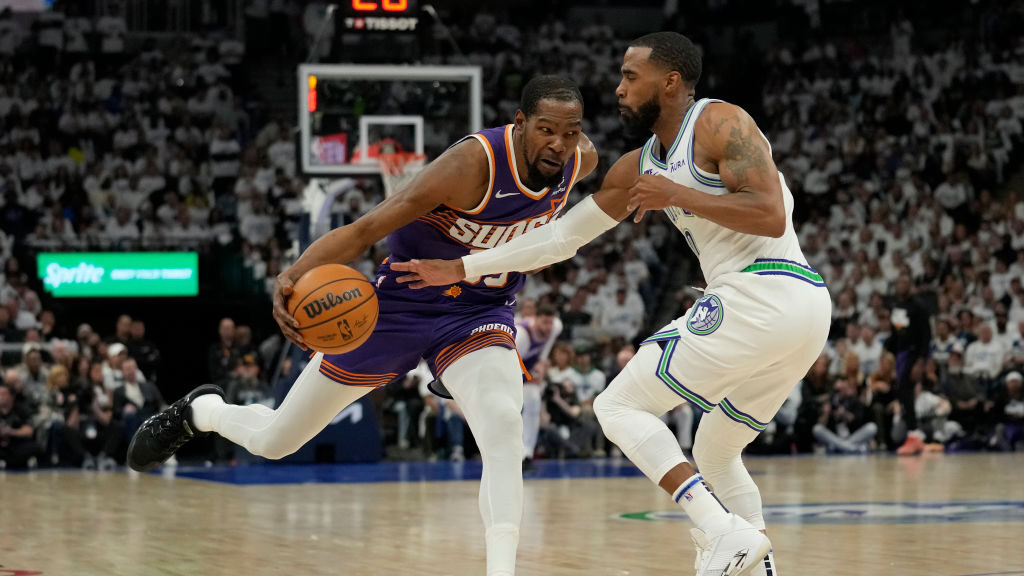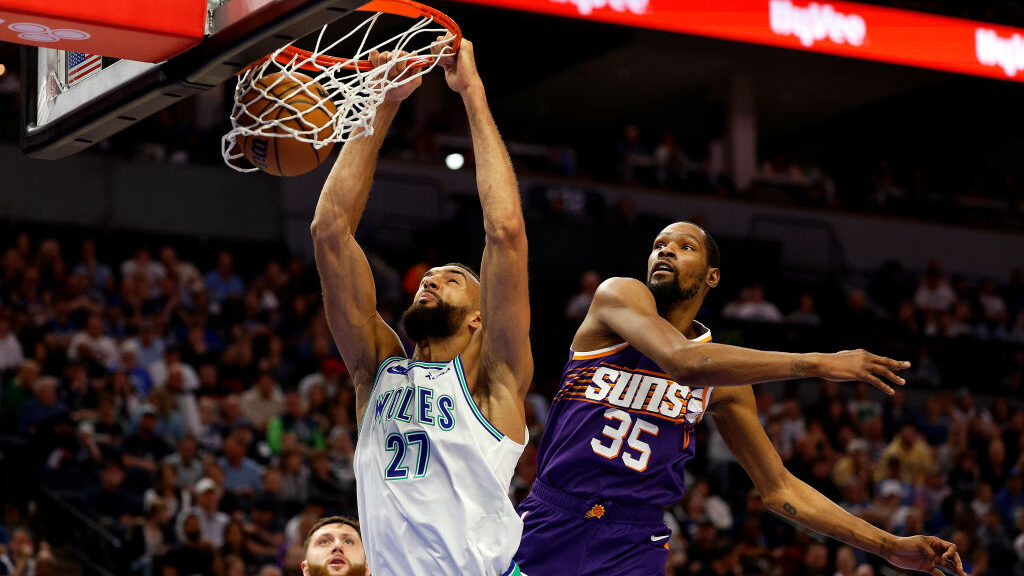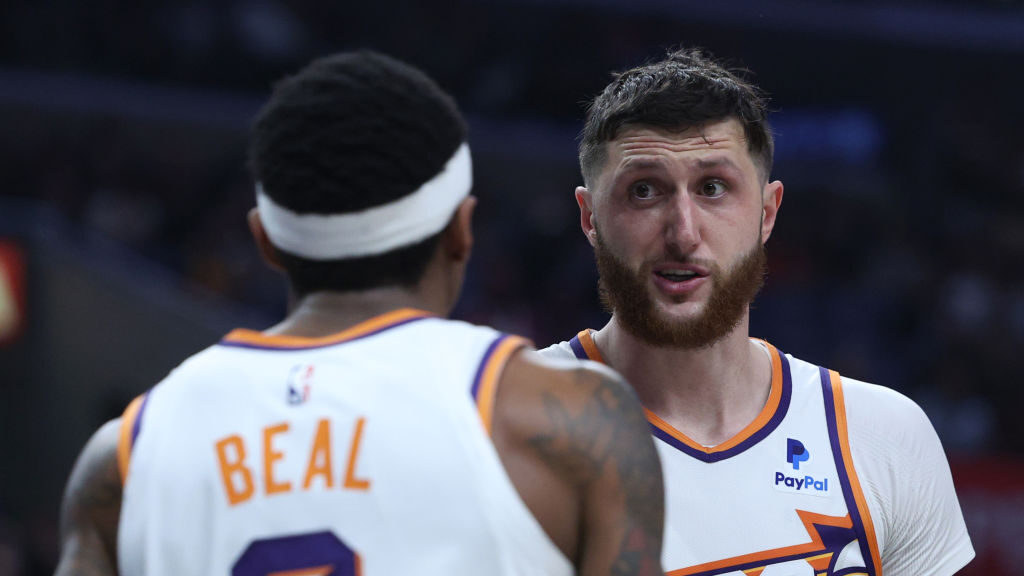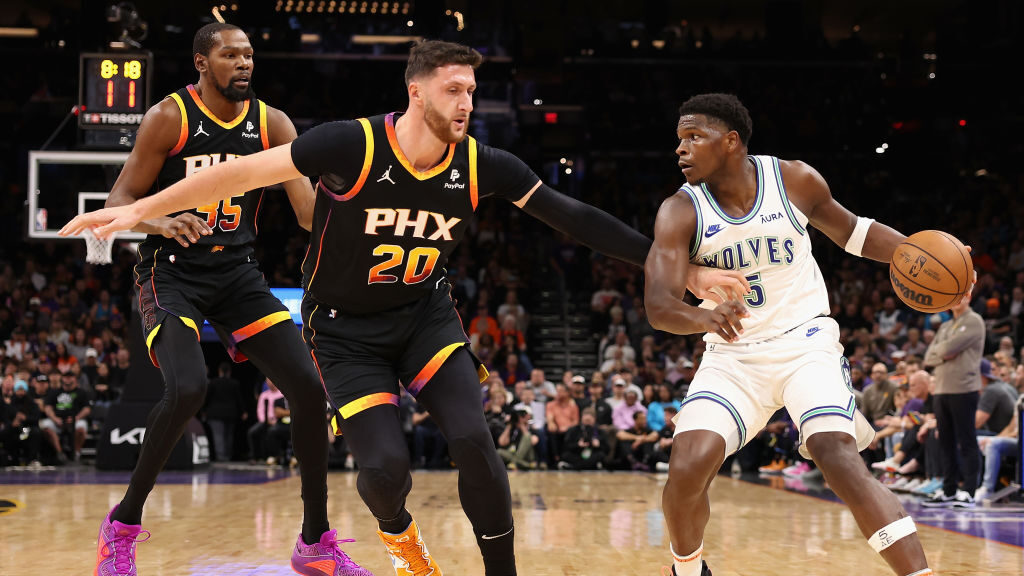Suns add unnecessary unease with no Deandre Ayton extension
Oct 18, 2021, 3:14 PM | Updated: 3:32 pm
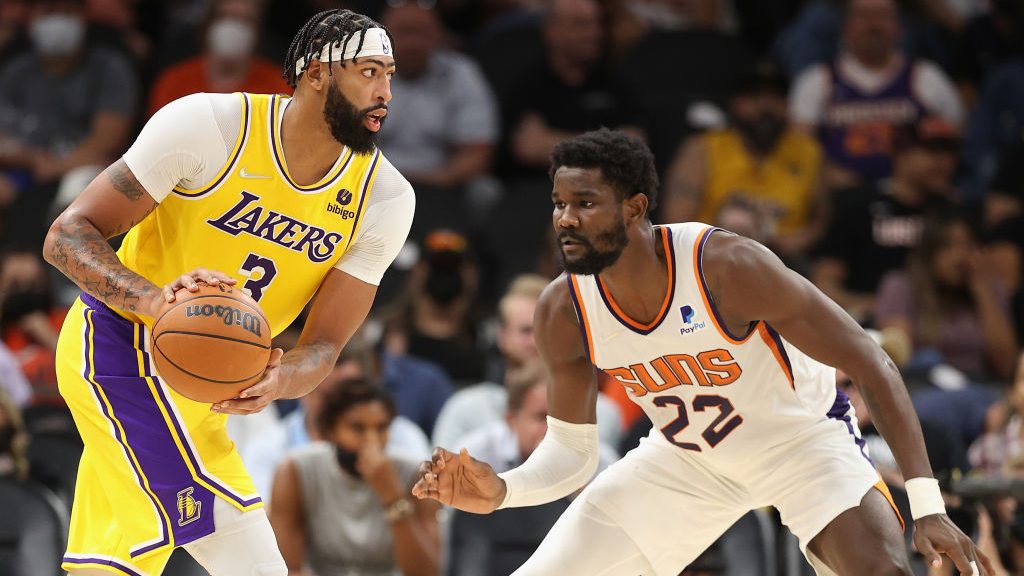
Anthony Davis #3 of the Los Angeles Lakers looks to pass around Deandre Ayton #22 of the Phoenix Suns during the NBA preseason game at Footprint Center on October 06, 2021 in Phoenix, Arizona. The Suns defeated the Lakers 117-105.(Photo by Christian Petersen/Getty Images)
(Photo by Christian Petersen/Getty Images)
The Phoenix Suns are currently in a position that most professional sports franchises would happily take.
They are in a window of contention while also developing a young core of players who should extend how long that cool breeze fills the room.
They have a new brand, The Valley, that’s on fire. The only thing harder to find in Phoenix than an affordable mortgage is a Devin Booker The Valley jersey on the team shop racks.
The Suns have a fresh arena after renovations, plus a new practice facility that competes with any other across the league.
And all of this is happening while general manager James Jones and head coach Monty Williams have turned the franchise from jokes about goat poop with a dark cloud hanging over its head to a place everyone wants to play.
There’s not much to screw up here or any reason to risk doing so, which is why it was befuddling to see the report from ESPN’s Adrian Wojnarowski that there will be no agreement on a contract extension for Deandre Ayton.
To start with the obvious, it is debatable that Ayton is 100% worth a max contract. It was in this calendar year when he couldn’t get locked in at home against the Oklahoma City Thunder’s Moses Brown and his disconnections on defense in Chicago had teammates looking at each other in confusion.
But if there’s one unanswerable question about players looking for a rookie contract extension, it’s about how well their game holds up deep into the playoffs.
Ayton answered that tenfold. He did better than anyone could have imagined in his first postseason, outplaying MVP Nikola Jokic and doing a tremendous job containing Anthony Davis and Giannis Antetokounmpo, all while maintaining his high-level production.
When the postseason got to the later stages, where gameplans become more aggressive and can play most centers off the floor, teams couldn’t figure out how to achieve that with Ayton. That’s because, well, it’s not really possible given his athleticism, speed and defensive prowess.
That’s my case for giving him the max.
But for those more uneasy about the decision, there’s now this “prove it” season for Ayton, right? Show them you’re a max guy all season.
Well, there are a few problems with that.
The most recent example is Gordon Hayward with the Utah Jazz in 2014. The Jazz were fine with not getting an extension done and seeing out restricted free agency. And when restricted free agency came, Utah doubled down, being OK to match whatever offer sheet came in.
It did, they matched and then Hayward left three years later. That’s because the offer by another team could only go four years. With a player option strategically attached on the fourth year, he declined it and left the Jazz. In essence, Utah lost two years off Hayward because it was too gun-shy to give him a five-year max.
And in another layer, the salary cap rose a pretty penny in the middle of that five-year window, making Hayward’s max contract a steal in hindsight. That spike is similar to what is expected to come for the NBA in the mid-2020s as well.
Hayward said his feelings of frustration and disappointment at the restricted free-agency process weren’t present at the time of him leaving, but whatever the case may be, the Jazz set a precedent for how teams can really goof this “no risk” situation of seemingly being in full control.
There’s also the unknown of the present: how this affects Ayton’s play this season in a wide open Western Conference. He already said he was disappointed by the negotiations and thought he was disrespected. No one can say with full confidence that it won’t change the way he plays.
Let’s go a step further: One way or the other, this shows the Suns front office lacks belief in Ayton. That’s especially the case after they gave $90 million to Mikal Bridges and $43 million to Landry Shamet. So what happens if Ayton does underperform in the first two months of the season? Would the Suns still match an offer sheet, or lose him for nothing? Trade him? That rabbit hole of speculation now stays open until Ayton has a new contract.
What’s next is that Ayton very likely gets a max offer sheet from another team, which projects at four years and $127.9 million before the salary cap for next year is set. It would take some pretty unforeseen events for that to not occur. The Suns will likely match, saving themselves roughly $45 million total from the $172.5 million five-year max guaranteed they could have offered before Monday’s deadline (without accounting for the escalators based on incentives that could have it reach $207 million).
Wojnarowski and Brian Windhorst are reporting the Suns were tentative to go with a guarantee for the full five-year max and never offered even a three-to-four-year max.
The Suns are just about a guarantee to be a luxury tax team for the 2022-23 season. They should be for a couple years after that with Cam Johnson’s extension coming and the two others recently agreed to. There is no getting around that as their fate considering potential contracts they can offer in free agency.
From a distance, it looks like this decision-making comes down to saving money on that luxury tax bill. That’s it. And don’t get me wrong, it’s a lot of money they will be saving.
But when NBA teams rebuild, this is all they could possibly hope for. Two good young players? That’s something. Three? Now we’re talking, rubbing our hands together like Birdman. Four? Let’s start thinking about Finals appearances, plural. If Shamet plays like the Suns think he will, that’s five.
What comes with that is paying for it. And premium young talent has a heavy cost. That is no grand mystery. The Suns knew it was coming.
We can sit here and debate if a guy was more worth $7 million a year as opposed to $11 million, but as we’ve seen with Shai Gilgeous-Alexander, Jaren Jackson Jr. and Michael Porter Jr., you cannot nickel and dime with premium young talent. Doesn’t happen.
Phoenix appearing to try and do that brings a level of concern back around the franchise. You wonder of if maybe that dark cloud was still there this whole time, serving as an extra dose of anxiety for the fanbase.

